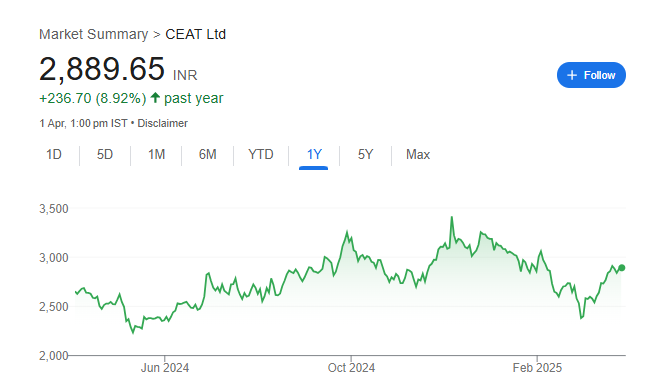CEAT Share Price Target Tomorrow 2025 To 2030
CEAT Limited is one of India’s leading tyre manufacturers, known for producing tyres for various vehicles like cars, trucks, and motorcycles. The company operates both domestically and internationally. Over the years, CEAT has built a strong reputation for delivering durable and high-performance tyres.
The stock price of CEAT is influenced by factors such as raw material costs, competition in the tyre industry, and changes in demand within the automobile sector. Like many manufacturing companies, CEAT’s performance can also be impacted by global economic conditions and fluctuations in commodity prices. CEAT Share Price on NSE as of 1 April 2025 is 2,889.65 INR.
Current Market overview of CEAT Share Price
- Open: 2,860.00
- High: 2,910.00
- Low: 2,849.00
- Previous Close: 2,879.50
- Volume: 23,166
- Value (Lacs): 670.15
- VWAP: 2,884.25
- Mkt Cap (Rs. Cr.): 11,701
- Face Value: 10
- UC Limit: 3,455.40
- LC Limit: 2,303.60
- 52 Week High: 3,578.80
- 52 Week Low: 2,210.15
CEAT Share Price Target Tomorrow 2025 To 2030
| CEAT Share Price Target Years | CEAT Share Price |
| 2025 | INR 3580 |
| 2026 | INR 3860 |
| 2027 | INR 4000 |
| 2028 | INR 4200 |
| 2029 | INR 4400 |
| 2030 | INR 4600 |
CEAT Share Price Chart

CEAT Shareholding Pattern
- Promoter: 47.21%
- FII: 15.83%
- DII: 20.54%
- Public: 16.42%

Key Factors Affecting CEAT Share Price Growth
-
Demand for Tyres in Auto Industry
CEAT’s growth is closely linked to the automobile sector. Increased vehicle sales, especially in two-wheelers and commercial vehicles, boost tyre demand, positively impacting its share price. -
Raw Material Prices
The cost of raw materials like rubber and crude oil derivatives affects production expenses. If raw material prices remain stable or decrease, it improves profit margins and supports share price growth. -
Export Market Expansion
CEAT exports tyres to various countries. A strong international presence and rising global demand can drive revenue growth, enhancing investor confidence and boosting the stock price. -
Government Policies & Regulations
Policies like import restrictions, incentives for domestic manufacturing, and infrastructure development can favor CEAT’s business, supporting long-term growth and a positive stock trend. -
Technology & Product Innovation
Investing in advanced tyre technology, such as fuel-efficient and durable tyres, helps CEAT stay competitive. Innovation attracts more customers and increases revenue potential, benefiting share prices. -
Financial Performance & Profitability
Strong quarterly earnings, revenue growth, and improved profit margins positively influence investor sentiment. Consistent financial performance attracts more investments and drives stock price growth. -
Competition in the Tyre Industry
CEAT competes with companies like MRF, Apollo Tyres, and JK Tyre. Gaining market share through pricing strategies, branding, and customer loyalty can strengthen CEAT’s position and support its stock price increase.
Risks and Challenges for CEAT Share Price
-
Fluctuating Raw Material Costs
The price of raw materials, especially natural rubber and oil-based products, significantly affects CEAT’s production costs. If prices rise, the company’s profit margins may shrink, leading to potential pressure on the share price. -
Intense Competition in the Tyre Industry
CEAT faces strong competition from other tyre manufacturers like MRF, Apollo Tyres, and JK Tyre. Increased competition can lead to price wars and reduced market share, impacting CEAT’s revenue and stock price negatively. -
Economic Slowdowns
During periods of economic slowdown, vehicle sales tend to decline, which affects the demand for tyres. This slowdown in sales can reduce CEAT’s earnings, causing its stock price to fall. -
Regulatory Changes
Any sudden changes in government regulations, such as stricter emission norms or environmental policies, can increase operational costs for CEAT. These changes might impact profitability and investor confidence, leading to a decline in share price. -
Supply Chain Disruptions
Global or local supply chain disruptions, like shortages in raw materials or transportation issues, can delay production. Such disruptions may result in financial losses and reduced investor trust, putting downward pressure on the share price. -
Currency Fluctuations
As CEAT exports tyres to various countries, fluctuations in currency exchange rates can affect revenue from international markets. A weaker rupee could increase revenue in local terms, but currency volatility could also negatively impact profits. -
Changes in Consumer Preferences
Shifts in consumer preferences, such as a decline in demand for traditional vehicles (which use conventional tyres), may impact sales for CEAT. If the company fails to adapt to changing market trends, it could result in reduced earnings and affect share price growth.
Read Also:- Trent Share Price Target Tomorrow 2025 To 2030







